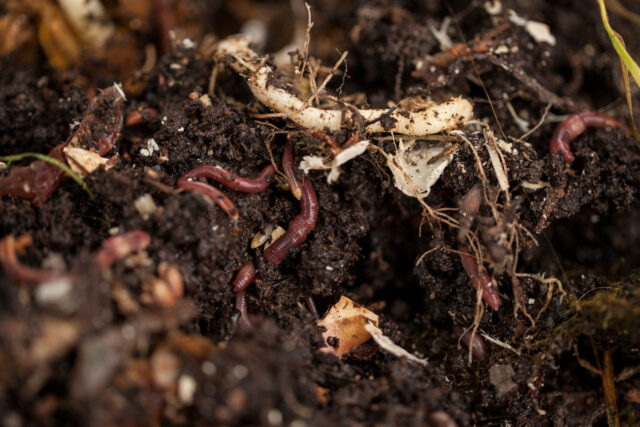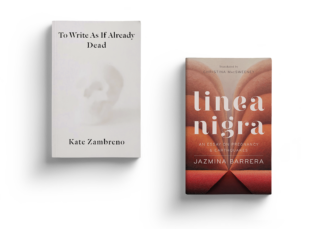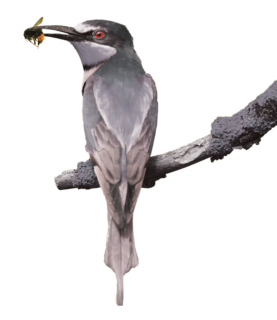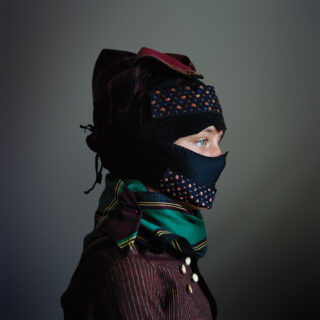
We moved to an old house north of the industrial estate. It’s a Victorian terrace on a double block with a large garden out the back. But inside there is a crack from the oven to the pantry, and in the bathroom the plumbing is broken, so when the toilet flushes, the drain in the shower burps bubbles of shit. Occasionally on damp days, worms appear between the gaps in the floorboards in the kitchen, and centipedes drop from the ceiling regularly in the bedroom. It was my idea to rent here, but we were also priced out of the city.
In the backyard are ten fruit trees and two vegetable beds. During daylight hours I am elbow deep in compost, in seed packets, in soil that the feral cats keep digging in. Every week, it takes two days of weeding just to keep the new growth at bay. I wrestle with the earth, pulling runner grass and dandelions out by their roots, becoming more and more ruthless as I pluck and prune and yank and poison.
My husband and I have a baby, so at night we play white noise loudly through the portable speaker. From 6 P.M. the house fills with the synthetic sounds of bubbling brooks, frogs, and crickets. Some nights I worry that snakes will find their way in and slither silently across the dark carpeted room, attracted by the sounds of the frogs. Some nights I have to shower instead of turning the light on to check for them. Some nights it is all I can do to not hunt them down by their tails, but I have always been quick to see snakes. A belt left on the floor, a tie from a robe, a stray shoelace. They’ve always been there.
I tried to give birth at home, but it didn’t work. When I get upset about it my husband reminds me it was because the baby’s head got stuck behind my tailbone in the cage of my pelvis and not because of generational curses. But with all the squatting and screaming and pushing, and then the effort and upheaval of being transferred to hospital to do it all over again — it is hard not to believe in jinxes. It is hard not to believe that a thirty-six-year-old woman can be damned. I used to think birth was the opposite of death, but now I know they are close cousins plaited together. I tell no one that it felt like our new house spat me out, contracting and dry heaving, into the waiting double doors of the ambulance. Because as the paramedic strapped me to the gurney, I looked backwards out the windows to the house that was still lit up, the windows fogged with heat, and it seemed, in that moment, to be both luminous and spiteful.
When I returned from the hospital, I asked my husband to dig a hole as deep as he could under the mulberry tree to bury the placenta. We wrapped it in a cotton pillowcase before placing it in the earth because we both agreed that an organ laying in the dirt seemed illegal or obscene. I tell no-one that I knew the garden didn’t want my placenta, that it slowly rejected it like a surface piercing. The earth pushed it up, and up, and then the animals came. Within three days the organ resurfaced and was dragged off and eaten by foxes, by ravens, by rats.
I wash rice in the sink, but it is blocked again, and the murky water stays level. Can you get a plunger after work tomorrow? I unscrew the rusted plug and pull wet noodles and coffee grounds out of the metal bowl. Can we not put coffee in here, please? Is it only me emptying the compost? My voice is high and shrill and in response the house falls into darkness. A fuse box thing. A broken bulb thing. My husband bangs his hammer into something in the next room while I sit at the kitchen table in the dark with the baby on my lap. We could be enveloped in ink. We could be drawn in charcoal.
At night, my husband and I sleep in the big bed with our baby between us. I worry the baby will learn to crawl overnight and fall off the edge, which will make him bleed from his brain. I sleep very lightly, perhaps I don’t sleep at all. My husband put camping mattresses around the bed like a moat. He added pillows from the couch and demonstrated how the baby would roll rather than fall if he did drop off the side, but I remain vigilant. Sometimes I wake up convinced that my baby is lost under all the folds of the blankets and I throw everything off in a panic only to find him sleeping sweetly with his chubby arms up alongside his big, elegant head. Sometimes I wake up in the grainy light of the early morning and find he has already woken and attached himself to my breast like a small hungry ghost, with his pale round face and dark eyes blinking back at me. And sometimes, if I haven’t slept at all, I wonder if he did actually die at birth and what I am witnessing is my body being haunted by him. I already know how I would grieve him. Visit his grave every day. Plant daisies on it and clip the grass around his plaque with kitchen scissors. Or funnel his ashes into capsules and swallow them so that he can be kept safe inside me. I hold onto his foot and cry while his cupid’s bow mouth chomps happily through dreams.
This week I had to net the olive, prune the lemon, and pick the last of the fruit from the peach tree. I collected the big blush-colored ones with the sap that oozes, whose sunset fuzz is made shadowy from the dirt in the air. At noon I retreat inside because of the smell of burning metal from the foundry two blocks over. In the house, I move from room to room winding all the windows shut and then run the sink full of water and white vinegar to wash the peaches in. Through the window I can see the gray cloud of smoke move across the garden leaving minuscule pieces of metal and glass as a coating over our food.
My baby grows tiny nails as sharp as talons and I try to clip them but cut his soft skin. In tears I look up how to cut baby nails without abusing him, and the internet suggests I bite them. I play a game where I pretend to munch on his body. He laughs effortlessly while I make the sound of a horse, of a wolf, of a snore, while biting his nails gently, and then in the same hour I am on my hands and knees, cleaning the kill zone around his highchair where old pumpkin and tofu has hardened on the floorboards. I graze the mop over it, smoothing it with the warm soapy water. Molding the flecks of old food until they merge into the pockmarks of the wood. I yawn as I mop, letting my jaw click open and the sound of exhaustion escape like a gas. After biting nails and moping, the afternoon is almost over.
Overnight, and without warning, it pours heavy rain. Lightning and thunder above our house for eight solid hours. We put tin bowls under the drips in the living room and unplug the computer cords. In the morning, I inspect the garden for damage and find broken branches and sodden chard. The feijoa tree dropped all its fruit in a frightened tantrum, and I fish the small, waxy green pods from the puddles near its roots. I ignore a distant, brewing plan to make them into chutney, and instead sit at the table and eat them one by one. A mound of their hollow skins grows to my left, but I don’t pause to consider the weight, the volume. While the foundry begins the daily burning, I keep spooning them in and in, in and in.
The house falls in around us in small and inconvenient ways. A towel hung on a bathroom hook is enough to pull it clean from the wall. The bath won’t empty and the window above it won’t close so mosquitoes lay their larvae in the still water. The oven sparks erratically when we light it. The rear sliding door becomes stuck open, letting all the wind and burning in. We ring the landlord and they eventually send someone around, and I greet the handy-man in my dirty pink robe with a nude baby in one hand and some muddy radishes in the other. I’m not usually like this, I say. Don’t worry, I’ve seen it all, he says.
Each house in the neighborhood has put out their discarded things onto the footpath for the council’s yearly hard rubbish collection. I leave the baby at home but take his pram, using it to drag furniture home. I pile a wicker chair in the seat and then stack a polished pine table on top. As I wheel it back, I become aware that each piece of furniture will outlive me, and the house might outlive us all. The baby — god willing — will outlive me. The citrus trees will outlive him if the drought breaks. As I push the pram through the door, and unstack the things in the hallway, I ask my husband if a house can be a mother because we live inside it. I ask my husband if he thinks he will outlive me, and if we should move. No, no, I don’t think so, he says.
In the garden I rake old leaves and torn pieces of plastic bags from the largest vegetable patch to prepare it for autumn planting. In the process I unearth a truck tire and several metal carabiners, perhaps the most boring archeological dig to ever be had. My husband lugs fresh bags of soil from the back of the car so that we can pour expensive-bought dirt into expensive-rented dirt. I dig small holes and plant kale, purple beans, pumpkin. I push each seedling into the bed and wonder if the garden feels the same way I did in hospital, under those lights, with a nurse’s hand so far in myself that I was made into her puppet while she tried to dislodge the baby. I water in the seedlings and then push stakes into the ground where I think they might grow. Birds watch from nearby branches as my husband carries the baby back inside. Do you want me to stop? I ask the garden.


